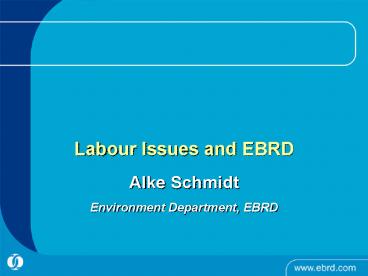Labour Issues and EBRD - PowerPoint PPT Presentation
1 / 15
Title:
Labour Issues and EBRD
Description:
Child labour, forced labour, non-discrimination. Community issues ... ILO conventions on child labour, forced labour, discrimination. Additional benchmarks are ... – PowerPoint PPT presentation
Number of Views:96
Avg rating:3.0/5.0
Title: Labour Issues and EBRD
1
Labour Issues and EBRD
- Alke Schmidt
- Environment Department, EBRD
2
EBRD
- AAA-rated international financial institution
founded in 1991 - Mandate facilitate the transition to market
economies in CEE/ CIS - Capital base of 20 billion
- Largest single investor in the region
- Project finance
- Over 70 private sector/privatisation projects
- Sound banking principles
3
A strong mandate in EBRDs Founding Agreement
- Requires a commitment from EBRD members to
respect human rights as a condition of membership
and borrowing - EBRD to promote sustainable development in the
full range of its activities - EBRD to foster productive investmentthereby
assisting in making a competitive environment and
raising productivity, the standard of living and
conditions of labour.
4
Operationalising the mandate Policy/Portfolio
level
- Countries human rights record assessed annually
in country strategies. Lending may be restricted
or suspended if lack of progress - Assessment criteria explicitly include
- Right to form trade unions and to strike
- Rights of ethnic minorities
- (cf Political Mandate Papers, 1991/93)
5
Operationalising the mandate Project level
- EBRD Environmental Policy (2003) covers
- Ecological issues
- Worker protection issues
- Occupational health and safety
- Child labour, forced labour, non-discrimination
- Community issues
6
How does EBRD assess labour issues?
- Process managed by Environment Department (ED)
- Integrated into EDs due diligence
- Risk-based, iterative procedure
- Screen all projects (risk assessment)
- Due diligence may include questionnaires or site
visits by ED / consultants - Focus resources on high risk projects
- Process developed in consultation with other
IFIs, ILO, experts
7
Labour standards risk assessment
- Credit risk (fines, loss of markets,
productivity) - Reputational risk
- Risk indicators
- Country
- Industry / sector
- Client policies / compliance record / reputation
- Employment impact of EBRD financing
8
Benchmarks
- All projects must meet
- National laws
- ILO conventions on child labour, forced labour,
discrimination - Additional benchmarks are
- EU (re discrimination)
- For remediation private sector good practice
9
What if there is a problem?
- Key is to move towards compliance
- i.e. reject financing only in extreme cases
- Action plan to achieve compliance with national
law / ILO standards within a reasonable time
frame - Often changes in clients HR policies required
- Enforcement agencies may impose corrective action
plan - Client reporting on action plan implementation
10
Legal documentation
- All projects Covenant on compliance with
national labour laws and ILO standards in
template legal documents - Covenant on Action Plan implementation if
required - Reporting on covenant labour compliance/action
plan implementation as part of annual reporting
on environmental and social matters
11
Monitoring
- Client reporting
- Monitoring visits by EBRD staff and/or labour
experts - Third party audits
- Role of NGOs/media
12
Resources and support
- 1 ED staff, plus labour expert consultants on
retainer - All ED environmental staff trained on labour
issues and risk assessment - Basic training for bankers on labour issues
- Country fact sheets, sample questionnaires, case
book on project work - N.B. This takes time!
13
Main issues to date
- Regulatory compliance
- Work hours /overtime in supermarket chain
- Retrenchment in privatisation/restructuring
- Exploitation of migrant workers in construction
- Endemic problems in country/region
- Supply chain issues
- Child/forced labour in cotton supply chain in
Central Asia
14
Outlook
- Revision of Environmental Policy in 2006 offers
opportunity to broaden scope and weight of social
assessment - Need to clarify supply chain requirements
- Process of continuous learning and improvement
- Share experiences with others
15
Labour Issues and EBRD
- Alke Schmidt
- Environment Department, EBRD































